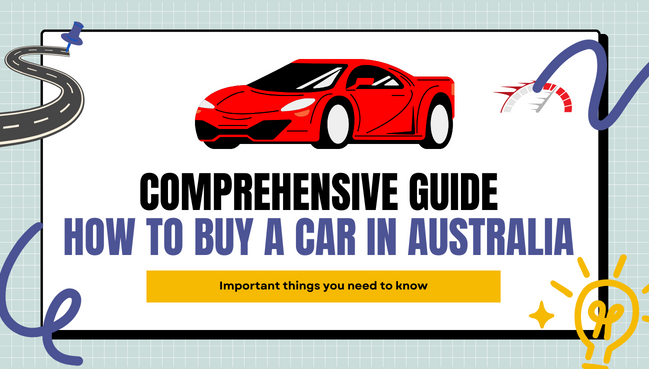Comprehensive guide: How to buy a car in Australia

Australia has a good public transportation system.
But because the country is so huge and spread out, it can sometimes be tricky to travel from one place to another.
Apart from that, there are some jobs or gig work that require a car.
As a result, many international students in Australia opt to buy their own cars.
If you are thinking of buying a car in Australia, this guide on how to buy a car in Australia will give you all the necessary information.
Let’s go!
Why Buy a Car in Australia as a Student?
As a student, buying a car can be a smart move for several reasons:
- Getting around daily: Having a car makes it easier to go to school, sports, or fun places whenever you want.
- No More Public Transport Stress: You won’t have to worry about train/tram/bus schedules anymore.
- Adventures and Social Life: Australia has so many amazing places to visit. You can explore beaches, national parks, and mountains with your friends using your car.
- Job Opportunities: As a student, you might want to work part-time. Having a car means you can take jobs that are far away and not easy to reach by public transport. You could even work part-time with companies like Uber or DoorDash.
- Easy Shopping: Getting groceries and other things you need for your home is much easier with a car. You don’t have to carry heavy bags on the public transport.
Factors To Consider Before Buying A Car In Australia
Getting a car has its advantages as shown above, but there are some important factors to consider before buying one. Some of the factors include:
- Purpose and Usage: Before you get a car, think about why you want one. Is it for going to school every day, having fun trips sometimes, or driving around Australia for adventures?
- Fuel Costs: Fuel can cost a lot. So, it’s smart to pick a car that doesn’t use too much fuel and has a higher fuel efficiency.
- Insurance Costs: Having insurance for your car is a big deal. Different cars can have different insurance costs. So, it’s a good idea to check and find the best insurance for the type of car you want. The cost can depend on things like what kind of car it is, how old it is, and where you live.
- Maintenance and Repairs: Some cars are easier to fix and maintain than others. It’s important to choose a car that doesn’t break down often and has parts that are easy to find. Different car brands have different reputations for being easy to maintain.
- Size and Features: Think about how big your car needs to be. If you want to work as a driver for a delivery company, your car needs to meet certain requirements. Also, consider how many people it can carry and some essential features like air conditioning and safety.
What Are the Costs Involved in Buying a Car in Australia?
Buying a car isn’t just about the price you pay upfront.
There are other expenses you need to think about for the future and to keep the car running.
Here are some of those costs:
- Purchase Price: First, you have to pay for the car itself. You need to find one that fits your budget, and that means looking at different types of cars and their prices.
- Registration and Transfer Fees: In Australia, when you get a car, you have to pay some fees to the government. These fees can be different depending on which state you live in. You will also need to factor in yearly registration fees as well. It’s a good idea to know about these fees, so you don’t get surprised by them later
- Insurance Premiums: Insurance premiums are required to pay for your insurance policy. It’s important to have this protection in case something bad happens, like if your car gets damaged or stolen. The price you pay for insurance depends on things like what kind of coverage you want, how you’ve driven in the past, the type of car you have, and where you live. You should always do research on different insurance types and costs from different providers.
- Depreciation and Taxes: Depreciation is how much your car loses value over time. It’s important because it affects how much money you can get if you sell your car later. Some cars lose value faster than others. Taxes can also depend on your car, like luxury cars can have higher tax costs.
- Loan Interest: If you’re taking a loan to buy a car in Australia, you have to think about the interest you’ll have to pay back. How much interest you pay depends on the interest rate and how long it takes to repay the loan. Also, consider that international students may not be able to access loan options when getting a car. So you may have to find alternative funding arrangements.
- Maintenance and Repairs: Owning a car means you have to spend money to keep it running smoothly. This includes things like getting regular check-ups, changing the oil, and fixing any problems that come up. Different cars can have different costs for these things, so it’s a good idea to find out how much they might cost for the car you want. Want to know more about the service costs of a car in Australia? Check this article out.
What Are The Most Affordable and Popular Cars in Australia?
Here is a list of affordable and popular cars in Australia:
- Toyota Corolla
- Mazda 2
- Hyundai i30
- Honda Civic
- Toyota Yaris
- Suzuki Swift
- Kia Cerato
- Mazda 3
- Toyota RAV4
- Kia Rio
You can find used cars for some of these brands under $5000. But if you are looking for a newer used car, then you should be ready to spend around $10,000 or more.
Brand-new cars from these brands can start from $24,000 onwards.
How Much Do You Need to Budget for Buying a Car in Australia?
Budgeting for a car in Australia can be a bit tricky because it depends on so many things. If you want a new car, it can cost a lot more than a used one. The type of car you choose also affects the price.
On average, people in Australia spend around $40,916 for a new car. But if you go for a small car, it’s about $26,346, while sedans are around $45,728, and SUVs are about $40,453. So, you need to think about what kind of car you want and how much you’re willing to spend.
When budgeting for a car, you should think about two main types of costs:
1. Purchase Price: This is how much you’ll pay to buy the car. It’s important to research and find a car model that fits your budget. Make sure it’s something you can comfortably afford without straining your finances.
2. Additional Costs: These are the expenses that come after you buy the car. They include things like registration fees, insurance premiums, taxes, and ongoing maintenance costs. These additional costs are essential to consider because they add to the overall price of owning and operating the car.
So, when planning to buy a car, you should not only focus on the purchase price but also factor in these additional costs to ensure you have a clear and realistic budget.
Steps Involved In Buying a Car in Australia
Buying a car requires proper planning to ensure you get the best value for your money. Here are the steps involved in buying a car in Australia.
Step 1: Determine Your Car Needs
When you want to buy a car, it’s important to think about what you really need the car for. This will help you pick the right car for you.
For example, if you want a car for ride-sharing service like Uber or food delivery, consider getting a Toyota. Two good choices from Toyota are the Camry or Corolla. These cars are great because they are comfortable, use fuel efficiently, and are economical to maintain. So, they’re a good match for what you want!
But consider your personal needs and decide which car might suit your needs better.
Some questions to ask yourself are:
- Budget for the Car
- Short term or Long term Car
- Fuel efficiency
- Car features
- Residence or Workplace or School Landscape
- Personal Car or Family Car
Step 2: Do your Research
Once you know what kind of car you need, there might be a few different cars that could work for you. So, it’s time to do some research to find out more about these cars. Here are some things you should look into:
- Dealerships vs Private Sellers
- Used vs New Car
- Financing options
- Insurance costs
- Taxes and other government fees
- Availability of parts
- Customer reviews
Step 3: Find a Good Dealership or Look for Private Sellers
Now that you know which car you want to buy, it’s super important to find a good and trustworthy place to buy it from.
Buying from a trusted dealership reduces the risk of fraud or stolen cars, comes with a warranty and the final price includes taxes or transfer fees. But it also means a higher purchase price.
These days, you can actually buy a car without leaving your home! You can do it online through trusted dealership websites. They’ll help you pick the car you want, and then they’ll deliver it right to your doorstep.
Buying from a private seller usually means a cheaper price, but you need to consider taxes and roadworthy certification expenses. Some private sellers may provide you with a roadworthy certificate, but some may not. It’s best to ask the seller for a roadworthy certificate. This will give you peace of mind that the car is safe to drive.
Here are some trusted websites for looking for cars in Australia:
Step 4: Inspection and Test Drive
After selecting the car of your choice, conduct an inspection and test drive to get the feel of the car. If the performance is satisfactory, you can move on to the next phase. Here are some things to look out for during vehicle inspection:
- Exterior and Interior Condition
- Tires and Wheels
- Undercarriage
- Engine Compartment
- Fluid Levels
- Battery
- Odometer Reading
- Service History
- Vehicle Identification Number (VIN)
- Suspension and Steering
- Brakes
- Safety Features
- Ownership Documents
- Roadworthy Certificate
If you are unsure about inspecting the car, you can hire the service of specialised mechanics. It can cost you $200 to $300, depending on your location, but it is money well spent to understand any issues with the car.
You can always negotiate the price of the car with the seller.
Step 5: Get the Paperwork Ready
If you’re happy with how the car looks and drives, and it ticks the inspection box, then it’s time to start dealing with the paperwork. The paperwork process can vary depending on which state you’re in. It’s important to follow the rules and regulations of your location.
Here are some of the documents you need for processing:
- Proof of Identity and Address
- Proof of Income and Financial Information (If applicable)
- Insurance Documents
- Roadworthy Certificate
- Pre-approval Documents (If applicable)
Things to Be Mindful of When Buying a Car in Australia
When you’re buying a car, there are some really important things to be careful about:
1. Vehicle History: Get a report that tells you about the car’s past. This can show if it’s been in any accidents or had problems before. It helps you make sure you’re not buying a car with hidden issues. Here is a useful website on how you can check the vehicle history for free.
2. Warranty: Look into what kind of warranty the seller or manufacturer offers. This is like a promise that they’ll fix any unexpected problems for a certain amount of time. Knowing the details of the warranty can save you trouble later on.
3. Ownership Transfer: When you buy a car, you need to make sure all the necessary formalities are done right. This means filling out the right paperwork and following the rules for transferring ownership. It’s super important to make sure you officially own the car. You will get in touch with the local transport authority within 14 days of purchasing.
4. Roadworthy Certificate: Also known as a pink slip sometimes, it is important to get this certificate when buying a car in Australia. This certificate ensures the car meets the standard requirements to drive on public roads in Australia. We suggest not buying a car without a roadworthy certificate.
How To Transfer A Car Ownership In Australia?
Transferring a car ownership in Australia is an important step when buying a car.
Each state has its own specific steps and rules regarding the transfer. To find out exactly what you need to do, you can go to your state or territory’s transportation website. They will have all the details and instructions you need to register your car properly.
Make sure to visit the transport authority office within the required timeframes after the purchase of the car to avoid late fees or penalties.
Usually you will be required to have the following when transferring the ownership of the car in Australia:
- Vehicle
- Proof of Purchase
- Your driving licence
- Roadworthy certificate
- Transfer of Ownership form
- Local government transfer fee
Here are the websites for each of the states transport authority to know more:


